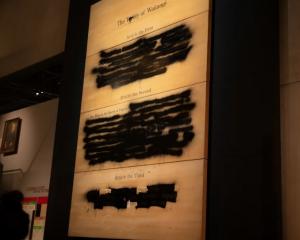The blogger who was infamously hacked and then exposed in Dirty Politics has himself admitted hiring someone to illegally access the computer files of opponents.
Whale Oil's Cameron Slater has been granted diversion by police for attempting to hire Ben Rachinger for $5000 to get into the left-wing "The Standard" blog. Instead of being convicted and sentenced, he has arranged to do 40 hours work for the children's charity Kidscan.
Judge Richard McIlraith said: "He has accepted his guilt and embarked upon a programme of diversion to address that."
The diversion process means Slater will not have a conviction for attempting to hire someone to carry out the same crime that he has complained was done to him by the hacker known as "Rawshark".
In 2014, "Rawshark" got into Slater's computers and took a massive amount of his personal data, providing it to journalist Nicky Hager.
The information was used to write Dirty Politics just before the 2014 election in which Hager claimed John Key's office was running a dirty tricks campaign through bloggers, especially Slater.
Documents presented to the court by Rachinger claimed Slater wanted "to use hacked information from the website The Standard on behalf of a funder to embarrass the Leader of the Opposition and Head of the Labour Party, Andrew Little, on the first day of Parliament sitting in 2015".
Rachinger, who never entered The Standard website and now styles himself as a whistleblower, is also facing a charge of deceiving Slater after allegedly taking money while promising to do the hack. He has pleaded not guilty.
The pair first appeared in court in December 2015. In January, Slater was interviewed by police and "found to be eligible for diversion", meaning he would have no conviction for a charge with a maximum sentence of seven years in prison. It's the same period in jail faced by Rawshark, although in that case the police cited the seriousness of the offence as justification for the search warrant executed on Hager's home later found to be unlawful.
Slater's name was suppressed from his first appearance, and Slater sought continued name suppression despite being a long-time campaigner against name suppression. It was a campaign which saw him convicted in 2010 over multiple name suppression breaches on his blog - and posting an article objecting to name suppression the same day he appeared in court arguing it should be granted in his case.
In asking for his identity to be protected, Slater told the court he was the "most hated man in New Zealand" and that publication of his name would cause "extreme hardship" to him and his family. He told the court there was an "orchestrated campaign to vilify" him and it was "ongoing and designed to cause extreme hardship" to him and his family. He also claimed Rachinger had "set out to deceive ... and trap him into offending".
Slater also said he wanted "my life to return to normal and feel that I have been a fool who has made mistakes for which I am taking responsibility". He accused Rachinger, the media and police of a "sick game" and said each was "working to continue the ongoing attacks on me and my family". He also said he wanted name suppression because it would put off people he had hoped would invest in "his business".
Judge Richard McIlraith said Slater "recognised the irony of his position given that he has previously written strongly against suppression orders". However, he had told the judge it showed him "the issues that arise" when on the receiving end of media interest.
The plea for name suppression was objected to by media lawyer Kristin Wilson, who argued that Slater's objections did not reach the level of "extreme hardship" which the courts have previously set as the trigger for allowing name suppression. She said Slater's "own conduct and the apparent hypocrisy of his stance" in seeking name suppression made the issue of particular public interest.
In a statement on his blog after the suppression order was lifted today, Slater said he "did not order the hacking of The Standard blog".
Instead, he said he paid Rachinger for information he believed had already been obtained. In the end, Slater said he gave Rachinger money but never received anything in return.
Slater wrote that his "state of mind at the time" was relevant.
"The world was out to get me" in the wake of Dirty Politics, he said.
Nicky Hager, who became a target for police hunting his source, said he was "shocked and disappointed at the apparent double standards" of police in offering Slater diversion while pursuing Rawshark so strongly. "It appears there was absolutely real intent to do a political hack and Cameron Slater was in there."
Hager was subject to a search warrant later found in court to be unlawful. "He didn't have his house raided, he didn't have his computers taken away - he got diversion."
- by David Fisher












